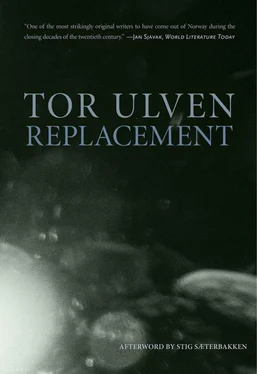Tor Ulven - Replacement
Здесь есть возможность читать онлайн «Tor Ulven - Replacement» весь текст электронной книги совершенно бесплатно (целиком полную версию без сокращений). В некоторых случаях можно слушать аудио, скачать через торрент в формате fb2 и присутствует краткое содержание. Год выпуска: 2012, Издательство: Dalkey Archive Press, Жанр: Современная проза, на английском языке. Описание произведения, (предисловие) а так же отзывы посетителей доступны на портале библиотеки ЛибКат.
- Название:Replacement
- Автор:
- Издательство:Dalkey Archive Press
- Жанр:
- Год:2012
- ISBN:нет данных
- Рейтинг книги:3 / 5. Голосов: 1
-
Избранное:Добавить в избранное
- Отзывы:
-
Ваша оценка:
- 60
- 1
- 2
- 3
- 4
- 5
Replacement: краткое содержание, описание и аннотация
Предлагаем к чтению аннотацию, описание, краткое содержание или предисловие (зависит от того, что написал сам автор книги «Replacement»). Если вы не нашли необходимую информацию о книге — напишите в комментариях, мы постараемся отыскать её.
Replacement — читать онлайн бесплатно полную книгу (весь текст) целиком
Ниже представлен текст книги, разбитый по страницам. Система сохранения места последней прочитанной страницы, позволяет с удобством читать онлайн бесплатно книгу «Replacement», без необходимости каждый раз заново искать на чём Вы остановились. Поставьте закладку, и сможете в любой момент перейти на страницу, на которой закончили чтение.
Интервал:
Закладка:
The little oil lamp, which isn’t lit (and which will never be lit), and his face, which forms an apelike mask and acts as a reminder of the close evolutionary relationship between man and ape (a horse or a bird, for example, doesn’t have the chubby cheeks it takes to pull off a convincing simian expression), of whose common origin you’re well aware, but not him, and not the people you imagine to be around him. If someone from the same time period were to see that fleeting apelike expression by the light of the burning twig, they’d never recognize the deeper genetic truth it contains; it’d just be an apelike mask, nothing more and nothing less, just a comical happenstance, but to you it seems like all the world’s apes, whether living or extinct, Dryopithecus, Ramapithecus, Loris, Colobus , gibbons, baboons, macaques, gorillas, chimpanzees, all the half-apes, ape-men, Australopithecus , and what have you, have formed an impatient, jostling line behind his face, behind the delicate mouth, hands, and eyes, which together control the flame (something no ape has ever done) by blowing on it, holding and examining it (consciously, not instinctively), demonstrating the highly complex relationship between the ability to hold things, the process of exhalation, and the thoughtful gaze, or the reflective gaze (eyes, that is, that can look in the mirror and can recognize themselves looking back), leading to the mastery of fire and thereby altering the relationship between light and dark, so that an individual no longer requires natural light to see, or, in other words, no longer needs hundreds of thousands or millions of years to perfect his night vision, but can simply drive darkness away by holding a burning twig up to an iron oil lamp, which will tranquilly burn through many nights to come. Unfortunately, fear of darkness follows close behind.
The oil lamp will stay unlit. All you can see is the endless, suspended second before the oil catches, while the twig still burns. As a result, you’ll never see the lamp come alive, you’ll never know where it’ll be carried, where it will get placed, what objects it’ll show (a book, piece of paper, handwork, coins, food, a clock, a harness, a deck of cards, some notes? or maybe just steps, the steps leading up to a bedroom?), you’ll never know who will use the light (the boy’s father, mother, siblings, grandparents, other relatives, friends, step-parents, another kind of guardian, a craftsman, priest, civil servant, orphanage director, or someone else entirely?); the next seconds or minutes, which could’ve resolved the question, are shrouded in darkness, just like the seconds or minutes before this one (apparent) moment, and if the twig weren’t lit, you’d see nothing, nothing at all. In the meantime, the first thing that meets your eyes is the light from the keyhole (though it isn’t the stereotypical shape of circle meeting trapezoid, but rather a single point of yellow light, like someone went and drilled a hole in the darkness) in a long line extending straight to your head, a keyhole in the door you can’t use, because you can’t get your wheelchair through it.
Noise, that’s what’s missing now. What noise in particular? The sound of her breathing, or rather the snorting, gasping wheeze of her breath (and you think how utterly ridiculous it is for someone to go on and on about the comforting sound of someone sleeping beside you ), which by some miracle you’ve learned to ignore, or rather, the mere necessity of falling asleep out of pure exhaustion has taught you to ignore the deafening biological racket coming from the next pillow over — that’s what’s missing. (You’ve been planning a treatise on feminine snoring for quite some time.) Your arm extends like an antenna toward the other side of the bed, proceeding slowly and cautiously at first (as if your arm, like a snail’s slimy eye stalk, could suddenly retract at will), then in ever widening circles within your limited range of motion, with greater firmness and impatience.
A crumpled sheet, but no warm body. Your hand learns nothing more, aside from the fact that the other half of the bed is uncharacteristically unmade. You turn on the reading light, and instinctively squint your eyes again, although a quick, painful glance confirms what your hands have already “seen”: an empty, unmade bed half. Is the closet door open? Are there clothes on the floor? Where’s the telephone? Is it within reach? Is it beneath the bed? Is the wheelchair next to the bed or at least close to the bed? Or is it far away from the bed? It’s hard to tell in the dim light. The overhead light. If only you could switch on the overhead light. The white, rectangular plastic switch is a weak gleam on the far wall, that damned switch, for four or five years now you’ve been meaning to have an electrician come and move it within reach of the bed, and now it’s too late (what do you mean it’s too late? do you think the ceiling light will never be switched on again?), but you’ve got something else to think about, don’t you? Indeed you do.
A blowgun. With a blowgun, you could practice shooting dried peas (or better yet, steel ball bearings) from the bed until you were a perfect shot, until you could always hit, or, more realistically, bump the switch every time; oh well, and anyway, who’d gather up all the peas (or steel balls) afterward? assuming one hundred percent accuracy, that’d mean twenty-eight, that’s right, twenty-eight peas (or steel balls) a week, you think, that is, one every evening for lights on, one every evening for lights off, one every morning for lights on (during the winter), one every morning for lights off (during the winter) = 4 x 7 = twenty-eight, twenty-eight peas (or steel balls) a week, assuming, that is, one hundred percent accuracy, which isn’t guaranteed; with seventy-five percent accuracy, 3/4, add another fourth to the total, which makes thirty-five, five and thirty, that’s right, thirty-five ball bearings, and that’s just for one week, it’d take thirty-five balls a week to turn the ceiling light off and on, but then who would pick all those balls back up again? you, of course, while you’re sitting in your wheelchair, something to do while you’re sitting at home, slowly rotting in place, you’d do it with a broom and a dustpan, no, a sawed-off broom handle topped with chewing gum, that’d be more elegant, you could even invent a new handicapped sport, in time you’d no doubt hold the Olympic record for the hundred-pea (or steel-ball) dash, men’s division.
Sickly-green, shaped like a bowl, decorated with orange-and-custard colored butterflies, as well as rust-colored leaf-shaped ornaments, which are symmetrical, stiff as flatbread and look like they’ve been carved from paper-thin slivers of ice, not to mention the yellow knob below, with its fancy, tongue-shaped spurs, like a creation of baroque confectionery, triumphantly adorning the bowl’s underside, the ceiling light’s southernmost pole, a decorative pastie stolen from a dancer at some lugubrious night club. The ceiling light. You remember that on dusky summer evenings, when the window stays open to combat the heat, that light has a magnetic effect on mosquitoes, moths, and flies, especially on flies, which after a series of restless, aimless forays, usually come to rest up there with the dust and the other dead insects, which are silhouetted against the glass when the light is on, dead actors in a dead shadow theater. The flying clock. You’ll never forget that evening she went out (for a so-called girl’s night) and never came home, you think, and that fly, a run-of-the-mill housefly, had somehow picked your light out of a hundred thousand other city lights glowing through that wet summer twilight, it had begun to wander around the inside of the open bowl, or rather right along the edge, the periphery, and with the lightbulb behind it, its shadow grew to monstrous proportions, until there was a giant fly shadow sweeping along the ceiling, rhythmically, tirelessly, around and around, following the identical course in the identical direction, a living piece of clockwork, with the light and its dead counterparts behind it, working around and around the same pointless course, the same giant shadow sweeping along the ceiling, a living, or rather a dying piece of clockwork, around and around, the same giant shadow thrown from the same mindless little insect; blind donkeys on a creaking treadmill, horses or scrawny oxen totally ignorant of what they’re doing when they pump water from a well or grind corn by plodding around and around the same circle, completely ignorant, but no, that’s not right, you think, because this was an entirely useless exercise, no corn was being ground, no water pumped, on the contrary, little bits of the fly’s energy stores (assembled by feasting on sugar, sweat, shit, jam, nectar, carrion, whatever else it had happened upon in recent days) were disappearing with every lap, miniscule particles of energy vanishing with each pointless lap around the edge of the lamp, although there was no visible change in its velocity, its speed remained more or less constant, except for the occasional short pause, like a pause for thought (sort of), as if the fly were capable of assessing its situation, before resuming its pointless trek back to its starting point, the same point every time, or another point, any randomly chosen point on the circle, around and around; an unflagging clock, a flying clock, it had nearly driven you clinically insane, as if its circling had been accompanied by an unbearable, agonizing drone. And you couldn’t stand up to turn off the light and make it stop.
Читать дальшеИнтервал:
Закладка:
Похожие книги на «Replacement»
Представляем Вашему вниманию похожие книги на «Replacement» списком для выбора. Мы отобрали схожую по названию и смыслу литературу в надежде предоставить читателям больше вариантов отыскать новые, интересные, ещё непрочитанные произведения.
Обсуждение, отзывы о книге «Replacement» и просто собственные мнения читателей. Оставьте ваши комментарии, напишите, что Вы думаете о произведении, его смысле или главных героях. Укажите что конкретно понравилось, а что нет, и почему Вы так считаете.












